Israel-Hamas war live: lack of water in Gaza ‘a health crisis on the brink of explosion’, says charity
“Action Against Hunger says overcrowded displacement shelters are close to breaking point
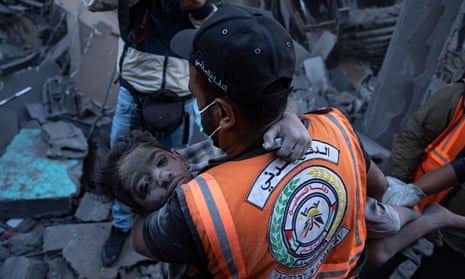
Lack of access to water is one of the biggest challenges in Gaza, according to the international charity Action Against Hunger, which is warning of “a health crisis on the brink of explosion”.
Staff at the charity say overcrowded displacement shelters are close to breaking point. They add that one shelter in Gaza is currently supporting more than 24,000 people and that 60% of the children there are affected by diarrhoea. Some people are are also resorting to open defecation.

The UN estimates that there are fewer than 3 litres of water per person each day for the 2.3 million people living in Gaza, half of whom are children who are most at risk from water shortages and diarrhoeal infections – the leading cause of child mortality globally. And that amount is likely to decrease by the day as supplies and fuel used to make water drinkable in the desalination plants are reduced.
Chiara Saccardi, officer for the Middle East at Action Against Hunger, said:
Faced with this impossible situation, many Gazan families are resorting to non-drinking water sources, such as agricultural wells. This puts them at imminent risk of dehydration and even an outbreak of infectious diseases such as cholera. Such an epidemic, if it happens, would make this serious crisis an even bigger problem.
Trucks carrying humanitarian aid will enter Gaza from Egypt’s Sinai peninsula in the coming days, according to the White House, after Joe Biden’s whirlwind visit to Israel that followed a deadly blast at a hospital in the besieged territory.
After hours of talks with Israel’s prime minister, Benjamin Netanyahu, and his war cabinet, the US president said Israel had agreed to allow the opening of the Egypt-Gaza Rafah crossing to deliveries of desperately needed food, water and medical supplies on condition that the humanitarian assistance was not diverted by Hamas for its own use.
“The people of Gaza need food, water, medicine and shelter,” Biden said.
More here:
Egypt and Jordan condemn ‘collective punishment’ of Palestinians in Gaza
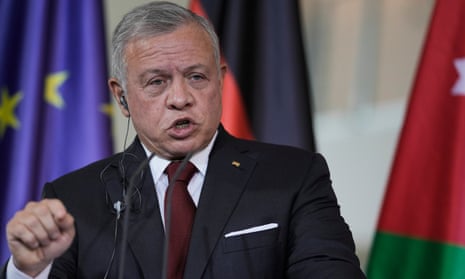
Egypt’s president, Abdel Fattah al-Sisi, and Jordan’s King Abdullah II have condemned the “collective punishment” of Palestinians in Gaza as they met in Cairo for talks on the Israel-Hamas war.
Ahead of the meeting, the Jordanian royal court said Sisi and King Abdullah would “discuss means to stop the Israeli aggression on Gaza”.
In separate statements issued later, the Egyptian presidency and the royal court said the two leaders “affirmed their unified position rejecting the policy of collective punishment in the siege, starvation or displacement” of Palestinians.
Sisi and King Abdullah also warned of the dangers of a regional spillover.
“If the war does not stop”, it would threaten “to plunge the entire region into catastrophe”, according to the Jordanian statement.

The pair had been due to hold talks with the US president, Joe Biden, and his Palestinian counterpart, Mahmoud Abbas, in Jordan this week, but Jordan cancelled the meeting after a deadly strike on a Gaza hospital.
Their meeting comes on the same day that the UN secretary-general, António Guterres, is expected in Cairo.
In a meeting with the British foreign secretary, James Cleverly, in Cairo on Thursday, Egypt’s foreign minister, Sameh Shoukry, discussed “the priority of delivering humanitarian and emergency aid to the people of Gaza”, according to the foreign ministry.
Sisi also discussed “the situation in Gaza” with US central command chief, Michael Kurilla, his office said on Thursday.
Egypt and Jordan were the first Arab states to normalise relations with Israel, in 1979 and 1994 respectively, and have since been key mediators between Israeli and Palestinian officials.
Dhananjayan Sriskandarajah, the chief executive of Oxfam GB, has written an opinion piece for the Guardian in which he says the charity has never seen a humanitarian crisis like the one in Gaza. He also calls for an urgent ceasefire.
Oxfam has been providing humanitarian relief for people caught up in war for decades. We do this in Somalia, Yemen and Syria, and we have been doing this in Palestine for decades. But what is happening in Gaza today is unprecedented.
Elsewhere, my brave colleagues would be running relief services; in Gazatoday they are running for their lives. Elsewhere, we would be in constant touch with them; in Gaza today their phones are running out of battery because electricity has been cut off. Elsewhere, we would share our location data with combatants to keep staff and civilians safe; in Gaza today, no one is safe.
Biden to address nation to discuss the US’s response to the Israeli-Gaza conflict
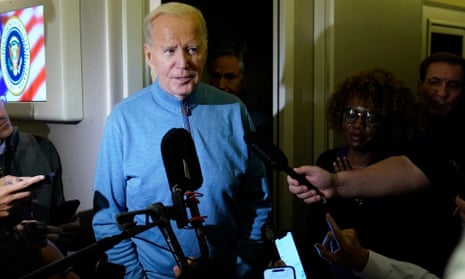
The US president, Joe Biden, will address the nation on Thursday to discuss the US’s response to the Israeli-Gaza conflict and the war in Ukraine, less than 24 hours after returning from Tel Aviv to offer Israelis support and aid for Palestinians in a trip upended by a hospital blast in Gaza.
In his remarks, scheduled to be delivered from the Oval Office at 8pm ET on Thursday, Biden will offer a message of solidarity to the people of Ukraine and Israel. But he will also address the nation, including US lawmakers, about the two conflicts’ impact, the deputy national security adviser Jon Finer said in television interviews.
“This will also be very much a message to the American people: how those conflicts connect to our lives back here, how support from the American people and the Congress, frankly, is essential,” Finer told MSNBC. (Via Reuters)
French airports evacuated again
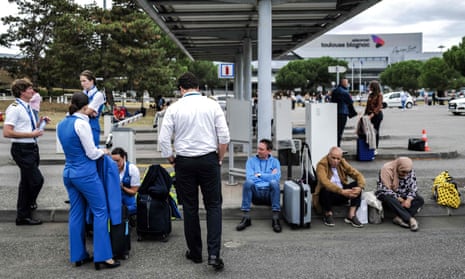
Several airports were once again briefly evacuated in France on Thursday – including Bordeaux-Merignac, Montpellier and Nantes – amid security alerts. They were reopened after security checks.
The Palace of Versailles, one of the country’s key tourist attractions, was also evacuated for the fourth time since Saturday.
Government ministers have said that prank calls with false bomb alerts will be punished under the law.
On Wednesday, France’s transport minister, Clement Beaune, said false threats were made against 17 airports in France, causing widespread disruption, the evacuation of 15 airports, the cancellation of 130 flights and many flight delays.
“These false alerts are not bad jokes. They are crimes,” Beaune posted on X, formerly known as Twitter.
17 aéroports menacés.
— Clement Beaune (@CBeaune) October 18, 2023
15 aéroports évacués.
130 vols annulés. De très nombreux retards.
Ces fausses alertes ne sont pas des mauvaises blagues. Elles sont des délits. Elles seront sanctionnées.
Une plainte a été déposée pour chaque menace. Avec une saisine du procureur @DGAChttps://t.co/fSlsdhKMrH
France has been on heightened alert since the fatal stabbing of a schoolteacher in Arras last week by a man alleged to have declared allegiance to the IS terrorist group.
Italy suspends open-border agreement with neighbouring Slovenia
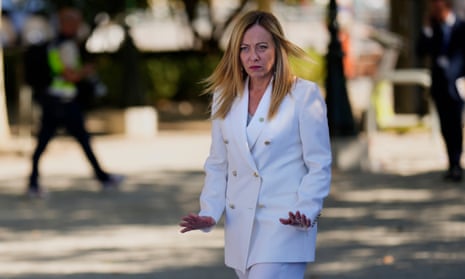
Following the killing of two Swedish football fans in Brussels on Monday by a suspected terrorist, Italy’s PM, Giorgia Meloni, has suspended the Schengen treaty and reintroduced controls at Italy’s border with Slovenia from Saturday 21 October.
Meloni said on social media:
The suspension of the Schengen treaty on free movement in Europe has become necessary due to the worsening situation in the Middle East, the increase in migratory flows along the Balkan route and, above all, due to national security issues.
I take full responsibility for this.
Meloni said border controls would last for 10 days, with the possibility of an extension, and “will be implemented in a way that ensures the proportionality” and “adapted” to the level of the “threat” and “calibrated to cause the least possible impact on cross-border movement and freight traffic.
The statement continued:
Further developments in the situation and the effectiveness of the measures will be constantly analysed in the hope of a rapid return to full freedom of movement.
It said the situation was “aggravated by the constant migratory pressure to which Italy is subject, by sea and by land” with 140,000 migrants arriving in Italy by sea this year, up 85% on the same period in 2022.
It said that the current police measures at the Italian-Slovenian border were “not adequate to guarantee the required level of security”.
Every day, small groups of asylum seekers from Afghanistan, Syria, Pakistan and Iraq attempt to cross from Bosnia into Croatia and Slovenia nightly on the migrant trail into western Europe in order to reach Italy or Germany. Aid workers, doctors and UN officials have documented systematic abuse and violence perpetrated by border guards against migrants along the border stretch for several years.
Spain’s Federation of Jewish Communities (FCJE) has called for respect and peaceful co-existence after a group of pro-Palestinian demonstrators converged on the main synagogue in Spain’s north African enclave of Melilla on Wednesday evening.
The federation said Jewish business owners were also insulted and intimidated by the protesters, who had chanted: “Israel! Killers!”
It detailed a series of antisemitic incidents across Spain over recent days, saying paint had been daubed in the Jewish neighbourhood of Besalú, in the province of Girona, and on a synagogue in Madrid, and that a Jewish home in the capital had also been marked out with paint. A Jewish couple, it added, had had a stone thrown through their window.
In a statement, the FCJE said:
Our synagogues and community centres are more protected than ever in the face of the threat of attacks.
We cannot allow the peaceful coexistence that we have historically enjoyed in Melilla and other Spanish cities to be broken. We express our solidarity and support to all the Spanish Jews who are suffering so gravely because of what is happening in Israel, and to their friends and families there.
We wish for a solution to the conflict that includes the end of the Hamas terrorist group, the safe return of the hostages, and the establishment of a just and safe peace.
The US general overseeing American troops in the Middle East made an unannounced trip to Egypt for talks on Thursday with the Egyptian president, Abdel Fatah al-Sisi that focused on the Israel-Hamas war and how to get aid to the Gaza Strip.
Egypt’s Sinai peninsula adjoins the Gaza Strip and its Rafah border crossing is the sole route for aid to enter Gaza directly from outside Israel. It is also the only exit that does not lead to Israeli territory, Reuters reports.
More than 100 trucks were waiting close to the crossing on the Egyptian side on Thursday, though it was not expected that aid would enter before Friday, Egyptian security sources said. More aid is being held in the Egyptian city of Arish, about 45 km (28 miles) from Rafah.
A statement from Sisi’s office said the talks with US army Gen Michael “Erik” Kurilla, head of US Central Command, included in particular “the developments in the Gaza Strip”.
The statement said.
The president outlined Egypt’s efforts for de-escalation, stressing the importance of the international community’s concerted efforts to contain the crisis and stop its escalation in dangerous directions.
The meeting in Cairo, where Kurilla also met Egypt’s defence minister, Mohamed Zaki, came as Washington and Egypt have been pushing for a deal with Israel to get aid deliveries to Gaza.
Sisi’s office said delivering aid in a “sustainable manner” was a top priority given deteriorating humanitarian conditions.
The Rafah crossing has become a focal point in the conflict between Israel and the Palestinian militant group Hamas as a humanitarian crisis unfolds and hundreds of thousands of Palestinians head to south Gaza from the enclave’s north to escape Israeli bombing.
The Israeli prime minister, Benjamin Netanyahu, and Britain’s Rishi Sunak on Thursday discussed the need to prevent any regional escalation in the conflict with Hamas, Sunak’s Downing Street office said.
Downing Street, according to Reuters, said:
Both leaders underscored the need to prevent any regional escalation in the conflict and the importance of restoring peace and stability to the region.
Four Palestinians were killed and several wounded, including children, in the airstrike on a house in Khan Younis in the southern Gaza Strip on Thursday, Hamas media reported.
According to Reuters, Hamas-affiliated Aqsa radio said four Palestinians were killed and several were wounded in the airstrike.
More information to come …
The chief executive of the FA said he “recognises the hurt” caused to the Jewish community by the organisations’s decision not to light the Wembley arch in the colours of Israel following the atrocities committed there by Hamas two weeks ago.
Mark Bullingham called the decision “one of the hardest” he has had to make as the organisation’s chief executive.
The FA came under intense scrutiny and received strong criticism over their response to the events of 7 October, ultimately choosing to acknowledge the moment with black armbands and a minute’s silence ahead of England men’s friendly against Australia last Friday. Bullingham said the organisation would now review its policy on lighting the arch.
Bullingham said:
I recognise that our decision caused hurt in the Jewish community who felt that we should have lit the arch and should have shown stronger support for them.
This is one of the hardest decisions we have had to make and the last thing we ever wanted to do in this situation was to add to the hurt. We aren’t asking for everyone to agree with our decision but to understand how we reached it.
Bullingham said that the decision had been made after days of deliberation, with the FA first contacting the Israeli Football Association to express their horror at the Hamas attacks. This was followed by a period of consultation across football and an extraordinary meeting of the FA board on the following Wednesday night.
He added:
We all felt then and we all feel now that football should stand for peace and humanity and that we should show compassion for all innocent victims of this terrible conflict.
Read the full story below:
The death toll of French citizens from the Hamas attacks in Israel has risen to 28, and seven others are still unaccounted for, the French foreign ministry said at a weekly briefing on Thursday, Reuters reports.
Summary - what we know so far today
The British prime minister, Rishi Sunak, has met Israel’s president and prime minister on a visit to the country
Sunak stressed the importance of allowing humanitarian aid into Gaza and said the UK stood in solidarity with Israel.
Sunak said the UK supported Israel’s right to defend itself “in line with international law”, to go after Hamas and to bring back the hostages.
A charity has warned that the lack of access to water in Gaza is “a health crisis on the brink of explosion”.
Gaza health officials say Israel’s bombing has so far killed 3,785 people and wounded more than 12,000.
Machinery to repair roads has been sent through the Rafah border crossing from Egypt into the Gaza Strip in preparation for the delivery of some aid tomorrow.
The bodies of two of those missing from the Nir Oz kibbutz in southern Israel have been found.
Israel says at least 203 people are being held hostage in Gaza – four more than its previous estimate of 199.
Sunak and Netanyahu joint press conference

Sunak and Netanyahu have just given a short press conference. Here are some of the key quotes and lines.
Netanyahu framed the conflict as a showdown between good and evil, modernity and barbarism, saying that both Israel and the world were facing their “darkest hour”.
He said:
This is a battle of western civilisation, the battle of the free world, the battle for the future. We have here two forces. One is an axis of evil, led by Iran through Hezbollah, Hamas and others, that want to bring back the Middle East to the Middle Ages, to an age of bondage and war and slavery and annihilation. And the other forces – the forces of progress and humanity – that want to push the Middle East into a world of peace and prosperity. We’re on the cusp of expanding that peace – and destroying that move was one of the reasons why this action was taken. We have to resist it and we have to win. Above all, we have to win. We have to release the hostages.
The Israeli PM said the war would be long, adding that although there would be “ups and downs”, the people of Israel had never been more united.
He described Hamas and its allies as “the modern barbarians; the worst monsters on the planet”.
Sunak said Israel had gone through something that “no country; no people should have to endure – least of all Israel”.
He also said that the UK supported Israel’s right to defend itself “in line with international law”, to go after Hamas and to bring back the hostages.
In a reference to concerns over Israel’s response to the Hamas attacks, Sunak added:
Now I know that you are taking every precaution to avoid harming civilians, in direct contrast to the terrorists of Hamas, which seem to put civilians in harm’s way.
The British PM thanked Netanyahu for his support for British nationals “caught up in this horror”, including the hostages.
Sunak referred to Tuesday’s blast at al-Ahli Arab hospital in the north of the Gaza Strip but did not speculate as to who may have been responsible for it. He said:
We’ve seen scenes over the past day that have shocked all of us, particularly in the hospital and we mourn the loss of every innocent life.
Sunak also thanked the Israeli government for its decision to announce the opening up of humanitarian routes into Gaza.
Lack of water in Gaza ‘a health crisis on the brink of explosion’, says charity
Lack of access to water is one of the biggest challenges in Gaza, according to the international charity Action Against Hunger, which is warning of “a health crisis on the brink of explosion”.
Staff at the charity say overcrowded displacement shelters are close to breaking point. They add that one shelter in Gaza is currently supporting more than 24,000 people and that 60% of the children there are affected by diarrhoea. Some people are are also resorting to open defecation.

The UN estimates that there are fewer than 3 litres of water per person each day for the 2.3 million people living in Gaza, half of whom are children who are most at risk from water shortages and diarrhoeal infections – the leading cause of child mortality globally. And that amount is likely to decrease by the day as supplies and fuel used to make water drinkable in the desalination plants are reduced.
Chiara Saccardi, officer for the Middle East at Action Against Hunger, said:
Faced with this impossible situation, many Gazan families are resorting to non-drinking water sources, such as agricultural wells. This puts them at imminent risk of dehydration and even an outbreak of infectious diseases such as cholera. Such an epidemic, if it happens, would make this serious crisis an even bigger problem.“

No comments:
Post a Comment